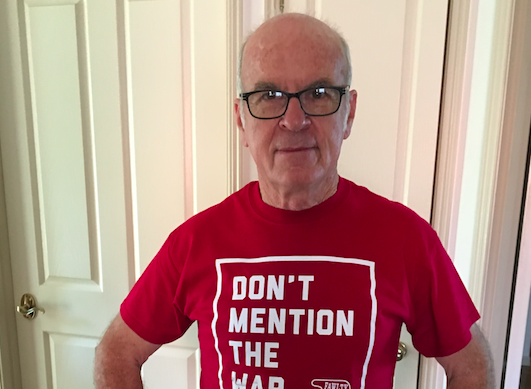John Titman was a big part of the Golden Era of speedway
John Titman was a big part of the Golden Era of speedway
What got you into bikes?
I was born in Brisbane and when we went to Rockhampton for our family Christmas holidays when I was six, seven, eight, we’d go to the local speedway. I got a 350 Matchless in my mid-teens. I lived about eight blocks from the local mud flats and that’s where we would ‘push’ our bikes to and learn how to slide. We didn’t have steel shoes; we’d buy army surplus boots for a couple of quid and have a ton of fun.
When was your first race?
I lied about my age and raced short-circuit on oil tracks, but my first speedway ride was at the Ekka in 1969.
There was speedway everywhere back in those days in Queensland. The southern venues would run solid through summer and the north Queensland tracks would run in winter; you could race all year round. I’d look at blokes paying entry fees to go road racing or short-circuit, but speedway paid a little bit of start money and okay prizemoney – I was making four and a half pounds a week as an apprentice mechanic so it wasn’t too bad.
You had a very unique mode of transport to get your bike to the track…
When I got married, we could only afford one car. I had my Yamaha SR500 fitted with a sidecar, so I used to load my Weslake into it along with my tools and riding gear. Sometimes I’d take off at lunch in the sidecar to do a practice session at the Ekka and return to work. When I turned up for international meetings at the Ekka in the outfit, the Poms and the Yanks had a good laugh!

Which riders inspired you?
Bert Kingston was superb around the Ekka, and Gordon Guasco was very hard, but very safe. The word ‘aggressive’ springs to mind with John Langfield; he’s been a great friend of mine. Langy’s 12 years older than me and was in the twilight of his career when I was coming through, but he was still very competitive.
Tell us about your international career.
The jump to the English league and world championships was a steep learning curve.
I started out in First Division at Halifax in 1972, then joined Exeter in 1976 where I teamed up with Ivan Mauger. We won a few league titles and in 1976 I returned home and won the Australian Speedway Championship.
I made it to the world championship finals at Wembley in ’78, finishing eighth, and made it again in 1979 in Poland. I joined Leicester that year, and to give you an idea of how big the sport was back then, I did 100 meetings in seven months.
I got into grass-track and long-track in the 80s and qualified for the world long-track finals in 1983 before retiring in 1986.
Mauger and Barry Briggs won 10 speedway world titles between them; what made them special?
I learned off Ivan – although he never told me, it was just by observing him – that you don’t need to be 100 per cent organised all of the time; you only have to be two per cent better than the other guy. I’d be at a meeting, and Ivan would turn up at 7:10pm for a 7:30 heat because he’d just flown in from another meeting. He’d done it so many times that he knew his bike would be ready and that he would be ready.
Briggo’s a great mate, we went trail riding a little while ago with his son Tony. At 81, Briggo’s just a remarkable bloke.
You’ve been very busy since you quit racing.
I started John Titman Racing in 1984, two years before I retired. We were the first distributor to import Talon, and we’re still going strong with it, along with many other top suppliers. My son Kevin is now the general manager, and my daughter Julie and my wife Anne handle the accounts. I’m down in the workshop, tinkering around.
There is a lot of theatre in speedway – how much of it is real?
I remember the time Gary Middleton gave Mitch Shirra a kick before the start of a race at Liverpool. Mitch got angry, missed the start and didn’t have a great race. When he got back to the pits, he picked up one of those concertina tool boxes and threw it at Gary, spanners flying everywhere, leaving Gary with a bloody beak. That was real.
Then there was the time John Langfield got excluded at the Ekka. He races around to the referee’s box above the start/finish line, jumps off the bike and starts scaling the fence, and then the pole to get to the ref. The crowd’s going wild, and then the ref sticks his head out of the box and asks Langy, “What in hell are you up to?” and John replied matter-of-factly, “Nothin’. I’m not fighting the exclusion, I just wanted to stir the crowd up…”
